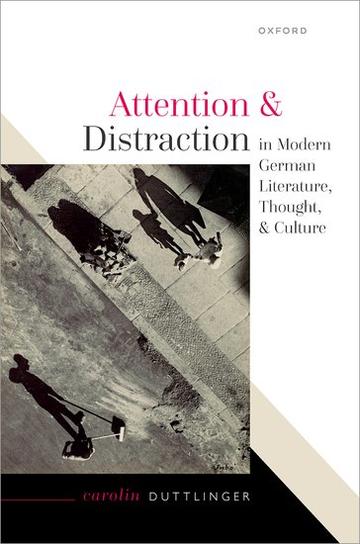Excerpt from Attention and Distraction
Recently, the OKRC’s Carolin Duttlinger published a new book called Attention and Distraction in Modern German Literature, Thought, and Culture with Oxford University Press. More information about the book can be found in our news section. What follows here is an exclusive excerpt from the chapter on Kafka.

The basic pattern [of a single moment of absentmindedness]—the inverse relation between a minor error and its major consequences—is one which Kafka employs in several narratives. One disturbing example is the fragment ‘Der Schlag ans Hoftor’ (The Knock at the Courtyard Gate):
It was in the summer, a hot day. On the way home with my sister I passed by a courtyard gate. I don’t know whether she knocked on it out of mischief, or absent-mindedness, or whether she just shook her fist at it and didn’t knock at all. A hundred paces further on, where the highway turned left, the village began. (HA 183–4)
As in ‘The Hunter Gracchus’, the decisive event takes place en route, in this case on the siblings’ way home. In this transitional state, which resembles The Trial’s moment of awakening, the characters are once again vulnerable to diverting forces. The topography of manor house and village prefigures Kafka’s last novel Das Schloss (The Castle, 1922), for in both texts, the villagers are under the spell of a feudal authority. In fact, ‘The Knock at the Courtyard Gate’ combines features of both The Castle and The Trial. The villagers seem to have witnessed the sister’s action, for they emerge from their houses
in a friendly way, but in warning, themselves terrified, and crouching low in their terror. [ . . . ] The owners are going to bring a complaint against us, and the investigation will begin right away. I was very calm, and calmed my sister down as well. She probably hadn’t struck the blow at all, and if she had, there was nowhere on earth where a trial would be held on that account. And I tried to make the people around us understand this too; they listened to me, but withheld their judgement. Later they said that not only my sister, but I too, as her brother, would be charged. I nodded, giving a smile. (HA 184)
Though the narrator tries to reassure his sister and himself, the villagers turn out to be right; armed riders are dispatched from the manor almost immediately, accompanied by a judge and his assistant. The narrator sends his sister away, asking her to get changed. He himself is taken to a ‘Bauernstube’ which is part prison, part interrogation (or torture) room. This is where the story breaks off, leaving a lingering sense that this trial, once set in motion, will unfold with merciless efficiency. As the judge remarks ominously, ‘I feel sorry for this man’ (HA 184).
The storyline is puzzling in several respects; the draconian response to the sister’s harmless action is only one part of this. Just as opaque are the causes behind this incident. Describing his sister’s action, the narrator gives no fewer than three different explanations: ‘I don’t know whether she knocked on it out of mischief, or absent-mindedness, or whether she just shook her fist at it and didn’t knock at all’ (HA 183–4). Mutwillen (mischief) and Zerstreutheit (absent-mindedness) map out the fraught terrain of insurability in Kafka’s time. A classic example of human error, absent-mindedness falls squarely within the insurable domain, while mischief lies beyond it in the realm of deliberate, possibly malicious, transgression. This interpretation seems to be pursued by the prosecuting authorities in Kafka’s tale. The third option mooted by the narrator—namely, that his sister raised her fist without actually knocking—is not really a separate scenario, although it does raise questions about the fundamental rationale of this ‘trial’. Is the punishable offence the action itself, or is it the (criminal) mindset behind it, a view propagated by the Austrian penal code of the time, which criminalized not just the criminal act itself but also the intention to commit a crime? According to this interpretation, an absent-minded, rather than a deliberate, knock might be even more transgressive, betraying a deeply rooted and almost casual defiance of the authorities.
Ultimately, though, all of these reflections are mere conjecture, for as the narrator admits, he did not actually witness what happened. Brother and sister, it seems, are linked by a shared absent-mindedness; his Zerstreutheit mirrors and exacerbates hers, and so he is neither able to prevent her action nor to provide a reliable testimony.
At a time when insurance law eliminated the principle of personal responsibility in all but the most extreme cases of recklessness, Kafka’s fiction reinstates this principle in unsettling narratives where the smallest of errors have the gravest of consequences. At the same time, responsibility in this universe is rarely clear-cut, not least because the motivation behind such errors ultimately remains opaque. In narratives which recall Freud’s Psychopathology of Everyday Life, Kafka shows attention to be deeply unstable, incapable of preventing errors and other transgressions which are driven by ultimately unknowable motivations.


